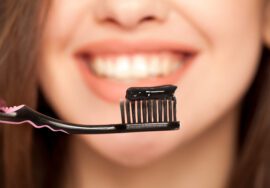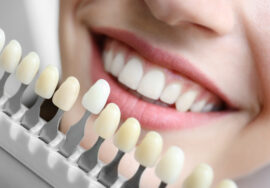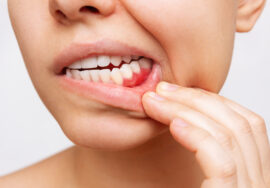
Tooth Sensitivity
Tooth Sensitivity occurs when the underlying layer of your teeth the dentin becomes exposed as a result of receding gum tissue (the protective blanket that covers the roots of the teeth). The roots, which are not covered by hard enamel, contain thousands of tiny tubules leading to the tooth’s nerve center (the pulp). These dentinal tubules (or channels) allow the thermal or mechanical irritation – for example, the hot, cold, or sweet food – to reach the nerve in your tooth, which results in the pain you feel.
There are many factors that may lead to the development of tooth sensitivity, including:
- Brushing too hard: Over time, brushing too hard or using a hard-bristled toothbrush can wear down enamel and cause the dentin to be exposed. It can also cause recession of the gums (the gum tissue pulls away from the teeth).
- Recession of the gums: As the gum tissue moves away from a tooth due to conditions such as periodontal disease, the root surface becomes exposed.
- Gum disease (gingivitis): Inflamed and sore gum tissue may cause sensitivity due to the loss of supporting ligaments, which expose the root surface that leads directly to the nerve of the tooth.
- Teeth grinding: Grinding or clenching your teeth may wear down the enamel and expose underlying dentin and cause tiny fractures (cracks) in your teeth. Chronic grinding also results in pain in your Tempromandibular joints (TMJ) and shorten your teeth causing an unaesthetic smile.
- Tooth whitening products or toothpaste with baking soda and peroxide: These products are major contributors to teeth sensitivity, although they cause no permanent damage to tooth structure when used correctly.
- Maintain good oral hygiene: Continue to follow proper brushing and flossing techniques to thoroughly clean all parts of your teeth and mouth.
- Use an extra soft bristled toothbrush: This will result in less toothbrush abrasion to the toothsurface and less irritation to your gums. Brush gently and carefully around the gum line so you do not remove more gum tissue. Do not brush your gums, but do angle the bristles of your tooth brush towards them. You should only feel a light brushing at your gumline.
- Use desensitizing toothpaste: There are several brands of toothpaste available for sensitive teeth. With regular use you should notice a decrease in sensitivity. You may need to try several different brands to find the product that works best for you. Do not use tartar control toothpaste; rather, use a fluoridates toothpaste.
- Avoid teeth grinding: If you grind or clench your teeth, use a custom made mouth guard at night.
What Can I do to Reduce Tooth Sensitivity?
Please contact us if you have any questions regarding tooth sensitivity or would like to schedule a time for us to address any symptoms you may be experiencing. We’d also be happy to demonstrate proper brushing and flossing techniques for you at your next visit.








